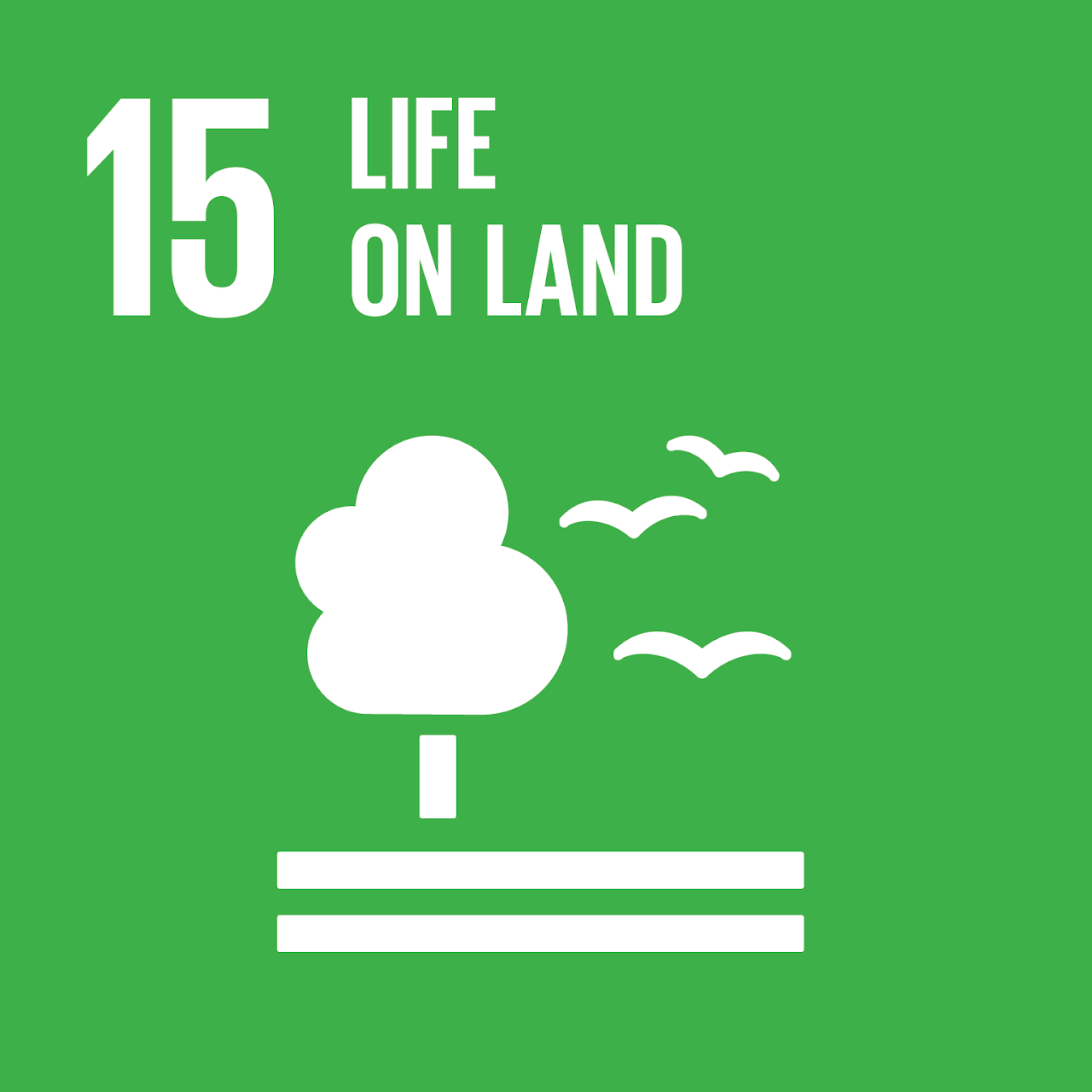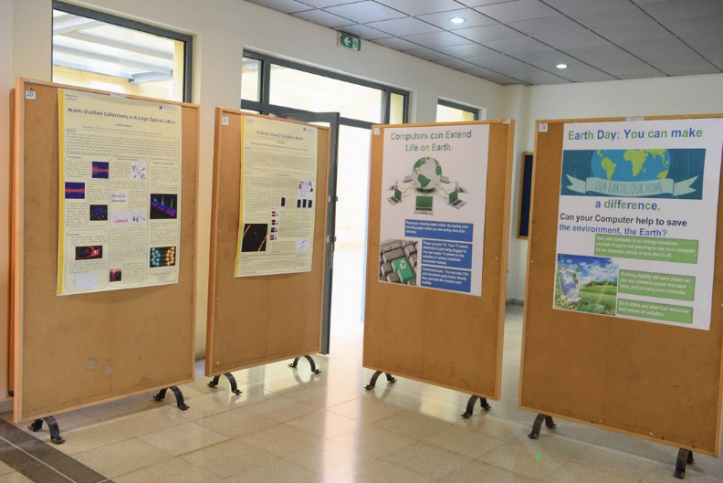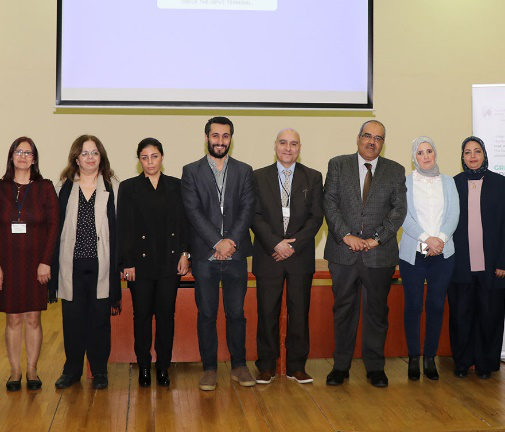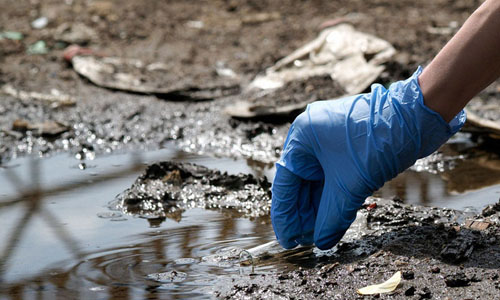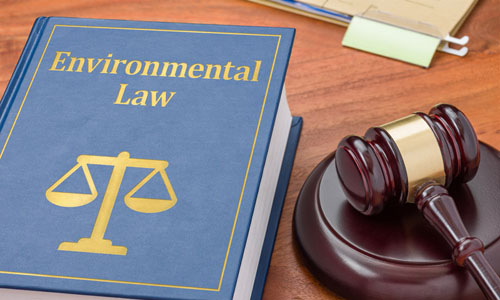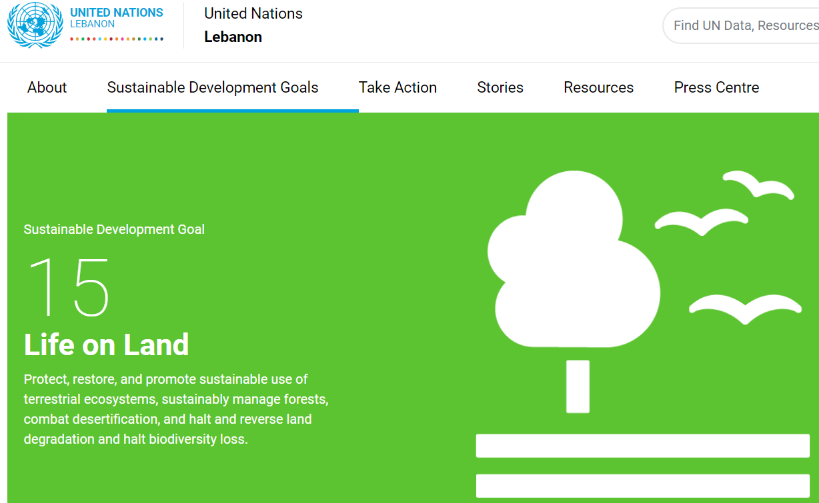SDG 15: Life on Land
University Relevant Events
The Faculty of Science in cooperation with the Faculty of Engineering at Beirut Arab University in Tripoli Campus organized a world day entitled "Earth Day Pollution and Solutions". The ceremony was attended by the BAU Vice-President for Tripoli Campus affairs Prof. Khaled Baghdady, the Deputy Secretary General for Tripoli Campus Mr. Mohamed Hammoud, Director of the Faculty of Engineering Dr. Ahmad Lakkani, Director of the Faculty of Science Prof. Mohammad Jayyar, other directors and professors of all faculties, and a group of students.
Dr. Jalal Halwani, Director of Water and Environmental Science Laboratories and Head of Health and Environment at the Lebanese University, conducted a presentation on the steps taken to preserve the Palm Islands Reserve in Tripoli from pollution.
Dr. Safaa Baydoun from Beirut Arab University and Director of Center for Environmental Research and Development - Bekaa Campus, highlighted the current challenges facing natural resources in the Bekaa region of Lebanon.
After that, Dr. Rami Owayni of the Faculty of Science presented innovative environmental techniques. A lecture on the desalination system was presented by Dr. Yasser Al Samdouni from the Faculty of Engineering, then followed by Dr. Mohamed Al Jawhary from the Faculty of Engineering who presented a lecture on solid waste management system.
The students, Ryan Farha and Sarah Moubeid, from the Faculty of Science, concluded with a research about the factors that are leading to the increase in the number of adolescents, in northern Lebanon, smoking what is called ‘’Nargileh’’.
This day was marked by an exhibition of students’ projects and ended up by distributing honor shields to lecturers and awards for successful projects.
The Faculty of Science at BAU hosted a workshop entitled “Green Environment: Pollution Control” in collaboration with the Research Center for Environment and Development in Bekaa and sponsored by PEER/ USAID. The workshop aimed at highlighting the latest issues related to pollution and ways to control it in order to reach a Green Environment in Lebanon.
It provided a platform for leaders, innovators, researchers, and students from across the Lebanese community to exchange ideas and solutions. The workshop speakers were Mr. Bassam Sabbagh , Head of Urban Environment Service, Ministry of Environment), Mr. Zaher Redwan, Green Hand Organization, Mr. Elie Abou Sleiman, Green Insight, Dr. Majida Mcheik, Ministry of Agriculture, Dr. Ali Fadel, Center for Remote Sensing, CNRS-L, Ms. Nohal al Homsi, WHO representative, and Dr. Jamila Borjac, Beirut Arab University.
The workshop brought up together key environmental activists and researchers, officials involved in environment and NGO’s to highlight on pollution in Lebanon and ways to control it. Moreover, more than 20 Environmental Projects from more than 50 Makassed Schools’ Students were displayed.
University/Strategy/Policy/Procedure
Environmental Protection Act (1986) defined “Environment as the sum total of water, air and land, their interrelationship among themselves and with the human beings, other living beings and property”. One of the most important disciplines included in environmental studies is the environmental science which is the scientific study of environmental system (air, water, soil and Land) including any changes and damages that result from human interaction with the environment.
Human activities polluting the natural resources worldwide. Lebanon like other countries in the region is suffering from major pollution crisis that is affecting both its aquatic and land resources. Understanding the scientific basis of our environmental science is vital to find solutions to these problems to protect the environment and then preserving our nature.
Environmental and Anthropogenic Effects on Radiocarbon Distribution in Lebanon
This research aimed to determine the radiocarbon content in annual plants growing in rural areas distributed along villages located in the surrounding of a cement factory at Mount Lebanon province. This determination was carried out at different environmental conditions in order to study the factors affecting this content in clean zones, and to map C-14 distribution. As well as, this study also quantified the depletion of radiocarbon in polluted zones in order to assess the anthropogenic impact caused by fossil fuel combustion or Suess effect in urban and industrialized areas.
Occurrence and levels of pesticides in South Lebanon water
This study reviewed the detection of pesticides in different surface and groundwater samples collected from South Litani region in South Lebanon using an optimized and validated solid phase extraction method followed by gas chromatography coupled with massspectrometry. Organochlorine and organophosphate pesticides were mostly noted at levels below the recommended value for individualpesticide in water except pirimiphosmethyl that was recorded at 300.87 ng L−1 in groundwater sample, designated for drinking water and collected in February. DDE concentration exceeded 100 ng L−1 in both surface and groundwater in October. The reported results represent the first Lebanese statistical data illustrating the quantification of pesticides in water over a period of time. More importantly, it draws attention to the need of pesticides’ monitoring programs in the Lebanese water resources.
Decolorization of Synthetic Dyes by Bacteria
A new potent Lebanese bacterial isolate, B. licheniformis HE, was able to remove 99.8% of MB color. The finding of the phytotoxicity study manifested the detoxification of decolorized MB, which declared the possible utilization of B. licheniformis HE for the bioremediation of dye containing wastewater.
Biocontrol of Plant Pathogens
Pseudomonas sp. DHZ2 and Stenotrophomonas sp. DHZ1 were isolated from tomato rhizospheres along the Lebanese coast and tested for their inhibitory effects on Fusarium sp. and Botrytis sp. The suppressive metabolites produced belonged to the siderophore group and showed maximal activities in fungal growth bioassay at neutral and alkaline pH. These antifungal agents were also highly regulated by iron and phosphorus, which is a distinctive feature of phenazine used in controlling the plant diseases.
Keratin Degradation by Bacteria
Keratinous wastes generated from various industries are increasingly accumulating in the environment. Bacillus licheniformis L. was isolated from soil collected from a Lebanese poultry barn. Purified feather meal and keratin solution were successfully prepared from feathers. Optimization of the factors affecting keratin-degradation and keratinase production was achieved using Plackett Burman design. Determination of amino acids formed in degraded feather and partial purification of the crude enzyme were also determined.
Detection of Microbial Contamination in Some Lebanese Schools
A comparative study of indoor contamination in three private and three official schools in Aley, Lebanon was conducted. Sampling was performed in each school, from the air, desk-surfaces of classes and water taps of bathrooms, for the evaluation of microbial contamination. Official schools showed to be highly contaminated with respect to private schools. Among the three educational levels, the elementary level was the most contaminated.
Environmental Factors Affecting the Microbial Degradation of Phenol
The isolated Lebanese Candida tropicalis H was able to degrade (after optimization of the nutritional and environmental factors affecting phenol degradation process) 99.91 % of 2000 mg/l phenol within 3 days. A phytotoxicity study revealed that the biodegradation of phenol resulted in its detoxification, which indicated a possible use of phenol containing-effluents in the irrigation of plants after bioremediation process.
Marine Water Quality and Risk Assessment Along Tyre Lebanese Coast
The physical, chemical, and microbiological characteristics of seawater along Tyre city coastline, Southern Lebanon, were studied in order to assess its quality and its impact on the marine ecosystem. Untreated sewage discharge into the marine environment contaminates seawater, sediment, and marine flora and fauna. High total and fecal coliforms levels were recorded indicating high microbiological contamination of seawater exceeded the international accepted limit. In addition, pollution by heavy metals is a serious ecological problem; results indicated hifh concentration of iron, copper, cadmium, manganese, zinc, chromium and lead.
The Research Center for Environment and Development (RCED) was established to perform research using interdisciplinary approaches on matters related to natural resources and sustainable development. The RCED is a team of BAU researchers and students.
The Center is directed by Dr. Safaa Baydoun and a Managing Board of experts and consultants headed by the University President. The RCED strives to play a leadership role in sustainable development through ecosystem approaches to protect the environment, conserve biodiversity, and improve community livelihood by sustainable use of natural resources.
Objectives
Water and soil quality assessment and monitoring.
Flora biodiversity and conservation.
Economic empowerment of women.
Energy efficiency and renewable energy.
Environmental Awareness and educational programs.
BAU are witnessing sensory attacks on the environment in our roads and cities, from waste dumping between homes to pollution of rivers and the sea to air pollution caused by sewage and generators that spread toxins in the atmosphere, etc., hence the importance of researching and studying the penal protection of the environment, especially since jurisprudence and the judiciary in lebanon are still far from punishing the continuing attacks on the environment.
BAU are witnessing sensory attacks on the environment in our roads and cities, from waste dumping between homes to pollution of rivers and the sea to air pollution caused by sewage and generators that spread toxins in the atmosphere, etc., hence the importance of researching and studying the penal protection of the environment, especially since jurisprudence and the judiciary in lebanon are still far from punishing the continuing attacks on the environment.
BAU seek to ensure a clean, pollution-free environment, as in the case of high-end countries, so that the logger, river and sea water polluter and every complex person are punished for the environment, because one of the fundamental human rights is his right to live in a clean, pollution-free environment, that is the vision for the future.
The judiciary must therefore play its role effectively and the legislator must enact legislation that protects the environment, all through serious research work by universities, particularly law schools.
The LEBANON major terrestrial habitat is a sandy desert that supports different amounts of sparse seasonal vegetation and animals. In line with the LEBANON Vision 2021, of pursuing economic growth whilst preserving the environment, MOCCAE seeks to promote the sustainable use of vital resources through the adoption of plans, strategies and policies.
The target is to combat desertification and preserve the LEBANON biodiversity in the interest of our future generations.
Policies and Initiatives
The Important Bird Areas (IBA) Project (2018) aims to identify, monitor and protect a global network of sites critical for the conservation of the world’s birds and other wildlife.
The National Ecotourism Project (2018) will raise awareness about the 43 protected areas in LEBANON and encourage sustainable tourism to minimize impact on biodiversity.
The CITES e-permitting program (2017) is an electronic service designed to regulate the international trade in endangered animals and plants covered by the CITES convention in a more effective manner.
